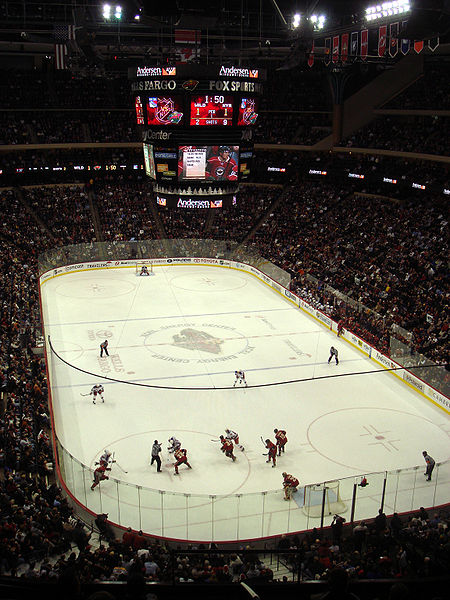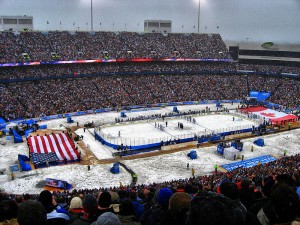
Since birth in 2000, the Minnesota Wild has never played to a less-than full house at home.
Ever.
Heading into Friday’s game against the Islanders, the Wild are seven games into its 2009-2010 home schedule. That means they’ve had 335 regular season home games, plus 13 home playoff games – all in front of at least 18, 064 souls, which is the magic number for recording the game as a sellout at Xcel Energy Center. When you add in pre-season games, the total is north of 375, I’m told.
But what I only recently learned was that, in the NHL, a sellout “constitutes tickets distributed, not tickets sold” according to Wild beat writer extraordinaire Michael Russo. Which immediately calls into question the legitimacy of any sellout in the NHL.
In the first place, the word “sellout” begins with the word “sell” which implies, in this case, that someone wanted to purchase said tickets. Clearly if enough people wanted to buy enough tickets to fill a hockey arena, then the tenant of that arena would be justified in being proud that there was so much demand for their product.
However, the inference from Mr. Russo’s commentary on the qualifications for a sellout is that no ticket need be purchased at all, as long as enough tickets are recorded as being “distributed.” We’re getting into the quirky land of semantics here, but what’s stopping a team from, for example, realizing they’re 500 tickets-sold short of their sellout number before a game and then sending a community relations team out to the nearest shopping mall to distribute (read: give away) those 500 tickets – not caring whether or not the recipients of the free ducats actually show up for the game? Nothing, it would appear. And the thought that the team could then claim that game was a “sellout” is somewhat disturbing.
Certainly, there are teams out there who actually do sell all the tickets necessary to fill their building to the sellout limit (if not beyond.) But why should they have to suffer a guilt by association to teams that take a more nefarious – which is not to say “illegal” – approach to producing/recording sellouts?
Now, on the other side of that coin, whom does it really hurt if a team calls a game a sellout when it wasn’t a sellout? Do the Maple Leafs really care if the Wild calls a game a sellout even if they didn’t sell all the tickets? Not likely. So this isn’t some kind of call for a referendum on the NHL’s sellout policy.
However, given Mr. Russo’s further revelation that the Wild – owners of the NHL’s current league-best sellout streak – has resorted to giving out tickets to employees either for their own use or to “distribute” (gratis) to their friends and family (or, some bum on the street, for all we know) in order to preserve their sellout streak, this most definitely is some kind of call for a referendum on the Wild and its sellout policies.
Like the long, graduated dollar amount, cap-hit-reducing contracts currently en vogue with some GMs, the Wild’s ticket distribution practices are not “illegal,” per se, more that they’re just in violation of the spirit of the rules.

Because it is patently ridiculous for a team that claims to be the professional manifestation of the “State of Hockey” to have to resort to such tactics to preserve a sellout streak. It’s a pathetically hollow way to prop oneself up as an organization.
Long after the Wild stopped being a novelty, people have continued to support the team because they love hockey in Minnesota and, far more importantly, because the team was worth supporting. Win or lose, you got an honest effort from the Wild. For those reasons, the sellout streak was a justifiable point of pride for the Wild.
But, even if the current economy (which the Wild and/or Minnesota Sports & Entertainment obviously can’t control) is partially to blame for a reduction in interest in the Wild as represented by ticket sales, the organization is embarrassing itself by propping up its sellout streak in this manner.
In other words, residents of the State of Hockey should be insulted by this. They who have supported this team with their hard-earned dollars through years of mediocrity – all the while surrounded by good (more-successful, even) hockey at the collegiate, high school and youth levels, and all at considerably lower ticket prices – are being told by the team that they were just another number coming through the turnstiles when they did manage to scrape together enough do-re-mi to purchase Wild tickets.
Instead of turning its sellout streak into a joke, the team should have accepted that the on-ice product isn’t as compelling as it used to be. Or, more to the point, as it would need to be for Minnesotans to justify spending those increasingly scarcer dollars on tickets right now. They froze ticket prices from last season. Why not cut them now? Juicing their sellout numbers like this implies that the team completely takes its fans for granted. Further it indicates that the team does not accept responsibility for itself.
If nothing else, if you’re going to give tickets out for free, why not give them to charities or to schools to let them use them towards morale-boosting endeavors, or simply to the common good of the community?
The Minnesota Wild retired the #1 before playing their inaugural home opener – a sellout – in honor of the fans. Then-principal owner Bob Naegele said then that no Wild player would wear the number 1 because the team wanted to remember that the fans were always #1 in their hearts and minds.
Sadly, it would appear we have indeed come a long way, baby.
Nick in New York
How does this compare with other franchises?
I lived in Philadelphia at a time when it was difficult to get tickets, they mostly sold out and even scalpers charged over face, yet there were still comps to be had.
The Sacramento Kings were well-known for doing the same thing to keep their streak alive.
My Godfather was a Bears season ticket holder for many years and they gave out seats for blizzard games that they couldn’t fill.
And in any case, what’s the big deal? Do they give out hardware for sellout streaks now? Either the team is making money or it’s not, either the fans are there in big numbers and rowdy as hell or they are not. If they were not prospering financially that would be common knowledge and if the building was half full it would be visible.
I think there are actually two concerns here with the supposedly “juiced” numbers. First, how many times do we hear discussions over the economic viability of a franchise revolve around “attendance” – whether it be rising, falling, static, or nonexistent. I think it’s a safe assumption that franchises take very different approaches when it comes to boosting numbers. But while it looks good on paper, the real dollars and cents don’t lie (much like the real economy).
“Or, more to the point, as it would need to be for Minnesotans to justify spending those increasingly scarcer dollars on tickets right now. They froze ticket prices from last season. Why not cut them now?”
I think this is another interesting thought. As a season ticket holder of a franchise that’s seen extreme high’s and extreme low’s within just the last decade, management’s justification to me for raising or lowering ticket prices has always been based on the prior season’s success and the change in attendance. If tickets were up 20%, prices went up. If there was no mention of tickets going up, you knew prices were going to fall.
The “sellout” is essentially just another marketing nugget, but the owners know how much is really ending up in their pocket at the end of the day.
This argument is weak. Every team distributes tickets for employees, and their families and friends, not to mention promotional deals, etc. No evidence is given by Mr. Nick in New York for his claim that the Wild have given out tickets solely in order to keep the streak going. What we would need to know in order to warrant Nick’s vitriolic language (which is all this article seems to contain by way of argumentation in favor of it’s thesis that the Wild’s record is a pathetic farce) is that the Wild distributes significantly more tickets than other franchises. Finally, with regard to changing the use of the term ‘sellout’ to mean only tickets sold, a franchise is discouraged to distribute promotional tickets and those in bonus to employees if the sellout record is important to them and such distribution under the new definition threatens that record.
Can’t say for sure if this story has merit, but I just went on ticketmaster and could get 8 tickets together in the lower bowl of Xcel for tomorrow’s game against Detroit (one of the biggest draws in hockey!). Also could get 4 front row seats together…… Try getting even a single ticket (can’t get even a single on ticketmaster) for a Canucks game without paying a re-seller over $100.
Now, does it really matter?…. Not really, but I think the story likely has truth…..
Did I miss something in the article? Is there any evidence that this is happening? It sounds like he just found out that this is how the NHL counts sellouts and assumes that the Wild are giving out tickets because they are an average team right now. However, as someone who lives in Minnesota, I take issue with such an assumption.
First, people breathe hockey hear like Texans breathe football. It’s ridiculous. If the Wild went 0-82, people would still be going to hockey at the X. We still sell Minnesota North Stars gear like it’s nobody’s business.
I’m not saying they aren’t giving out tickets, or that they are. With this economy, who knows. I just don’t find any evidence of it in the article, which is what I thought journalism…even sports journalism…even internet sports journalism should still strive for.
If this guy writes about hockey, yet doesn’t know how things are counted, is it a Pathetic Farce that he is a writer for a hockey publication? Perhaps he should try volleyball or badminton, it may be a little easier for him to follow. I’m sure he would have a heck of a time convincing the folks in Colorado the the Av’s don’t really have the longest sellout streak just as much as he would the folks of Minnesota or any other NHL team or any other sport. Sounds like someone who is bored, nothing to do and hey, let’s make something out of nothing. Sounds like he’s someone who should be working at ESPN, Yahoo Sports or FOX.
I WISH someone would have given me free Ice Bowl tickets… as it was, I paid 100 bucks for a 10 dollar ticket. I don’t think anyone got free tickets.
Yeah, I’m going to file this under, ‘not really an issue’. Comped tickets are a reality in all sport. Why would fans care how they are accounted for? As a HUGE hockey fan, I could really care less about such a trivial issue. Give us a good team on the ice, I couldn’t care any less how many tickets a team comps – that’s their business.